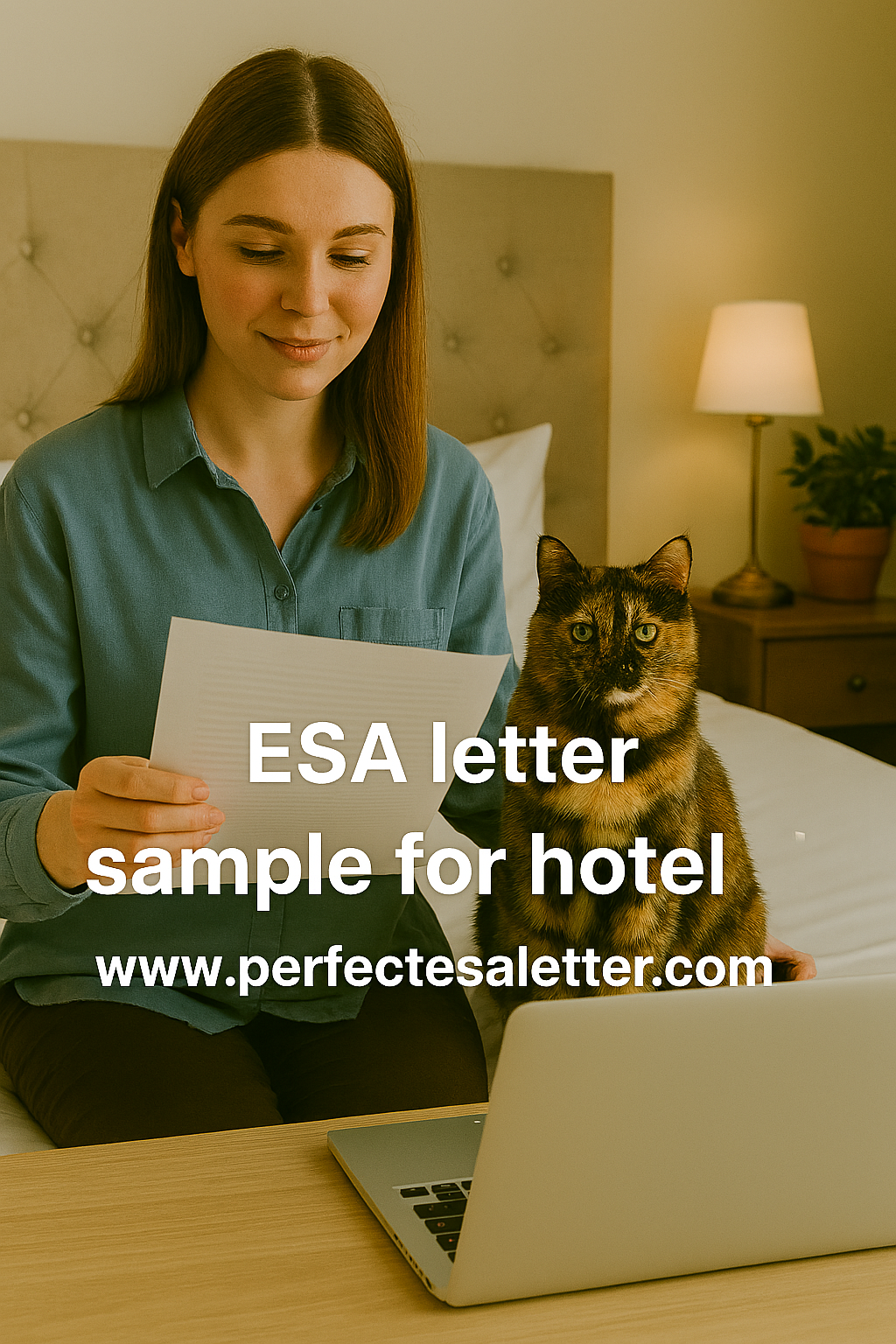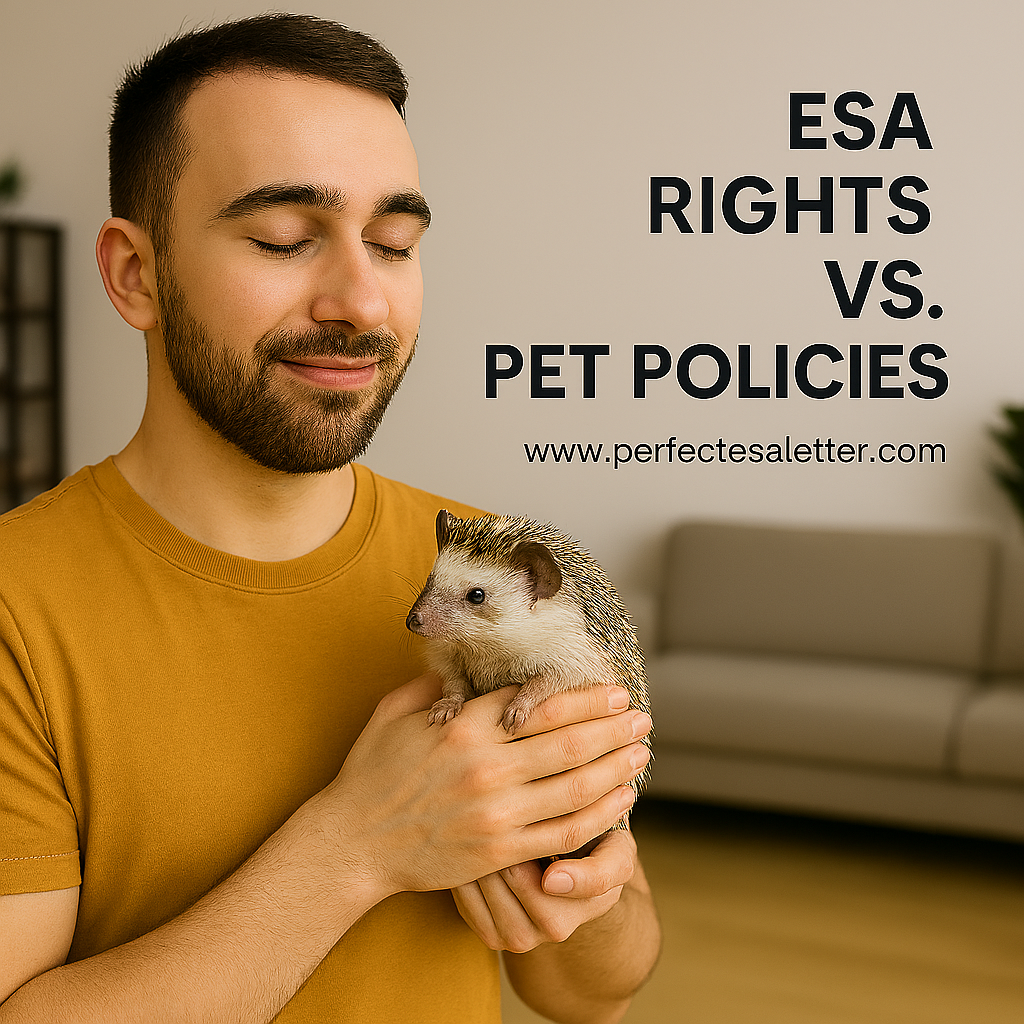ESA Travel with Resort Booking: Bringing Your Emotional Support Animal
Article
Introduction
Resorts offer luxury, comfort, and recreational activities for travelers seeking a memorable getaway. For individuals with Emotional Support Animals (ESAs), staying at a resort can be challenging due to no-pet policies or unfamiliarity with ESA regulations.
A valid ESA letter ensures that you can legally bring your ESA to a resort, providing emotional support and comfort throughout your stay.
This article explains ESA travel with resort bookings, legal considerations, and best practices for a smooth experience.
”Get Yours Now!
Don’t wait until a landlord or airline tells you “no pets allowed.” Protect your rights today.
Please fill out this form and our team wil contact you ASAP.
Complete your assessment in minutes , get approved by a licensed professional, and receive your letter within 24 hours.
Why ESA Letters Are Important for Resort Travel
Traveling can trigger:
- Anxiety, depression, or panic attacks.
- Emotional distress in unfamiliar or crowded environments.
- Stress from changes in routine while away from home.
Your ESA provides:
- Emotional support and comfort.
- Stress relief and mental stability.
- Assistance in maintaining mental health during your trip.
Without a valid ESA letter, resorts may:
- Deny accommodation.
- Charge extra pet fees or deposits.
- Impose restrictions based on breed, size, or species.
Legal Protections for ESA Travel in Resorts
- Fair Housing Act (FHA)
- Applies to long-term residential lodging, which may include resort stays with extended bookings.
- Requires hosts to accommodate ESAs with valid documentation, even if no-pet policies exist.
- HUD (Housing and Urban Development)
- Provides guidance on ESA accommodations in qualifying residential properties.
- Air Carrier Access Act (ACAA)
- Relevant if flying with your ESA to your resort; airlines require ESA documentation.
⚠️ Note: Short-term resort stays may not always fall under FHA protections, but many resorts voluntarily accept ESAs with proper documentation.
What a Valid ESA Letter Should Include
To ensure acceptance at a resort, your ESA letter must:
- Be issued by a licensed mental health professional (LMHP).
- Include official letterhead, signature, date, and license number.
- Confirm that the guest has a mental or emotional health condition.
- State that the ESA provides necessary emotional support.
❌ Generic or fake ESA letters are often rejected. Always use verified professional letters.
How to Travel with Your ESA to a Resort
- Obtain a Valid ESA Letter
- From a licensed therapist, counselor, or psychiatrist.
- Check Resort Policies in Advance
- Confirm whether the resort accepts ESAs or pets.
- Notify the Resort Early
- Provide documentation and request approval for your ESA.
- Provide Documentation
- Submit your ESA letter during booking or check-in if requested.
- Confirm ESA Accommodation
- Ensure the resort acknowledges your ESA and allows it during your stay.
What Resorts Can & Cannot Do
✅ Allowed:
- Verify ESA documentation.
- Require ESA to be well-behaved and under control.
- Hold guests responsible for any damages caused by the ESA.
❌ Not Allowed:
- Charge extra pet fees or deposits for ESAs.
- Deny accommodation solely because of the ESA.
- Reject your ESA based on breed, size, or species.
Common Challenges
- Host Confusion
- Resort staff may confuse ESAs with regular pets.
- Short-Term Stays
- FHA protections mainly apply to long-term or residential stays.
- Crowded Environments
- ESAs must remain calm to avoid disturbing other guests.
- Invalid ESA Letters
- Fake letters are often rejected. Always use a licensed professional.
Tips for a Smooth Resort Stay with an ESA
- Keep ESA Letter Accessible – Bring printed and digital copies.
- Train Your ESA – Ensure calm and respectful behavior in public areas.
- Respect Property Rules – Clean after your ESA and follow resort guidelines.
- Communicate Clearly – Confirm ESA acceptance before arrival.
- Be Responsible – Cover any damages caused by your ESA to maintain good relations.
Real-Life Example
Emily booked a week-long resort vacation to unwind and enjoy recreational activities. She has an ESA dog to manage anxiety. Although the resort had a no-pet policy, she submitted her ESA letter from a licensed psychologist.
The resort approved her ESA, waived any fees, and Emily had a relaxing and enjoyable stay. Her ESA provided emotional support, allowing her to fully enjoy her vacation.
FAQs
Q1: Can resorts charge fees for ESAs?
👉 No. ESA letters legally exempt tenants from pet fees or deposits in properties recognizing support animals.
Q2: Do I need to provide my ESA letter for each resort stay?
👉 Yes, each resort may request verification for your stay.
Q3: Are all resorts required to accept ESAs?
👉 Long-term or residential stays may fall under FHA protections, but short-term resort stays often comply voluntarily.
Q4: Can resorts deny ESAs based on breed or size?
👉 No. ESA protections override size, breed, or species restrictions.
Q5: What if my ESA misbehaves during the stay?
👉 You are responsible for any damages or disturbances caused by your ESA.
Conclusion
Traveling with an ESA at a resort is achievable with a valid ESA letter. Proper documentation, early communication, and responsible behavior help ensure a smooth and stress-free stay.
By securing a licensed ESA letter, notifying the resort in advance, and respecting property rules, you can enjoy your vacation while keeping your emotional support companion by your side.
👉 Your ESA is more than a pet—it provides essential emotional support and stability during travel. Proper planning and documentation are crucial for hassle-free resort bookings.
✅ That completes Article #262: ESA travel with resort booking.
Do you want me to continue with #263: ESA travel with bed and breakfast next?










